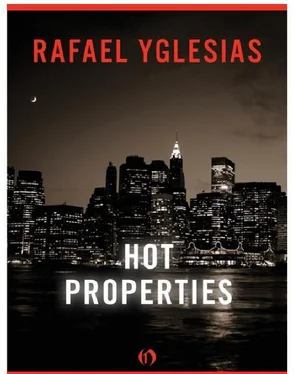Tony was thoroughly drunk when he got home. His mouth tasted of metal, his food felt undigested, and his mind went over Gloria’s promises and statements slowly, like a straight line he couldn’t keep his wobbly feet on. He splashed cold water on his face and stared at his bloodshot eyes. Gloria had told him she wanted to represent him. That alone would have been a break for a writer his age. Gloria said she believed she could help get his plays to Broadway if he worked in the movie business. She cited many examples of productions that were backed by movie money, and said, with a broad look, “They protect their own, you know. Write Bill Garth’s script. It will get made, the studio will love you, and buy your next play, and put it on Broadway.” Gloria laughed. “A year and a half from now you’ll have a Tony and an Oscar. You can use them for andirons.”
Tony had laughed at her. She had laughed back. They had traded looks of superiority. “You don’t care about awards and money,” she went on to say. “I know that. But I know you care about mounting a real production of your next play — and Tinseltown can do it for you.”
The last year Tony lived in California he was five years old. He had no ambitions other than wishing he were Superman or an airplane pilot. He liked movies, but they were commonplace. Everyone he knew had a screening room in the den: they were adult work, and they caused adults to have boring conversations at dinner. But the bogeyman had been in town, his mother had had a breakdown and disappeared from his life. When she returned, the boring conversations became shrill with rage and terror. His parents would begin their rumbling after he went to bed. Their voices, dark and terrible, would wake him. He’d creep out, carefully placing his feet to avoid floorboards that might give his presence away, and eavesdrop on their fights.
“I couldn’t betray people!” his mother screamed one night.
Tony heard nothing for a long time, and then his father’s deep voice said, “You wouldn’t have been lying. They were communists. And they still are.”
His mother screamed instantly: “Then so am I.”
Tony hated his mother. She was ugly like that. Why did she get so upset? He knew she was right — he felt it — but why did she have to be so loud and silly? That’s what made his father angry, Tony felt, nothing else, just her ugliness.
That was his father’s last night with them. A few months later, his mother took him to New York, where he had lived the rest of his life, except for summers in California, or other parts of the world, when he visited his father. By his ninth birthday, Tony didn’t want to be Superman. And he hated movies. By then, he would stay up late, worrying over why his mother was out so late again, and read plays. Soon, he spoke the parts aloud, and found himself crying, or dueling, or making love. He understood nothing of the plays, and yet he understood everything. He was still a baby, but he had become as old as humanity’s literature. He had never loved, or died, or ruled a kingdom: but at night, while buses belched beneath the window, he was a king, a lover, and he died a hundred terrible and wonderful deaths.
Theater grabbed his life by the elbow, slowing its hurried pace, and replayed its exquisite arguments and loves. Plays glued his shattered loyalties together, and let him weep, not only for his brilliant and brave mother but also for his scared and weak father.
Routine knowledge told him differently, but his heart couldn’t dispel the lesson of his boyhood: movies destroy.
Patty noticed him, but it was too late. At the head of the BMT subway stairs, standing in a pool of his own urine, was a bum, laughing at her. His head moved jerkily from side to side as if he were dancing, only his feet were still, like a drunk jack-in-the-box.
Patty tried to hurry past him, but the steps were steep, and she half-stumbled, preventing a fall by righting herself with an outstretched hand, placed, unfortunately, at the border of the bum’s piss. Horror shot through her so palpably that her nerves were stung, and she screamed.
“What the fuck?” the bum mumbled, his eyes big and wounded and wondering, like a child’s.
Before she could think, Patty was off the stairs and bouncing between hustling midtowners on their lunch break. I escaped, she thought, but that did not relieve her desire to scream or cry or beg someone — anyone — on this busy corner to hug her and take her away from this mad city and her hopeless life.
She had trouble finding the restaurant. The sun glistened on the storefronts across the avenue. The lettering on the signs wavered and shimmered, as if beguiling her to misread them. She squinted while she walked, peering across the midtown traffic. She bumped into people and worried each time that her purse was gone or that a pickpocketing genius had unlatched it and removed her wallet without her knowledge. She walked past the restaurant because she was so concerned with the opposite side of the street, and ended up in a phone booth getting the address from Information. (Even that was a struggle: at first the operator claimed she wasn’t supposed to give out addresses; she relented when Patty explained it was only a restaurant, not a residence.) Thus, when Patty finally appeared at Betty Winters’ table, she was twenty minutes late.
“I’m sorry,” Patty said breathlessly.
“I’m crocked. I’ve had two glasses of wine,” Betty said with a tipsy smile. “What happened?”
“I can’t find anything … I don’t know where I am or who I am.” Patty waved her arm distractedly. Her frizzy and wild hair flounced with the movement. The whole picture made Betty laugh. “I mean it,” Patty said in the nearest she could come to an angry tone with another woman, namely petulance.
“I’m sorry. It’s the wine. So — I was talking with Howard Feingold about you. He needs an associate editor. He expects you to call.”
“Oh.” This made Patty feel guilty at having snapped at Betty. “Where is he?”
“Fire Books. Quality paper.”
“Thank you. Do I know him?”
Betty laughed again. “I don’t know. Do you?” She controlled her smile to ask seriously, “Are you okay? Tony said you seemed fine at Fred’s.”
“Fred,” Patty repeated, remembering the kiss in the hallway. Had last night really happened? Everything in her life seemed to quiver in her consciousness, as if her memory were a poor television signal.
“Tony said you went home with someone, a journalist.”
“We shared a cab,” Patty said. She had intended to tell Betty of her passionate night with David Bergman, but Betty’s eagerness to hear gossip turned off Patty’s desire to give it. “No more talk about me,” Patty said with pert emphasis. “I’m sick of me.”
“Well, I’m very boring. I have no gossip.”
“How about work?”
“I don’t have enough books for my list. I had something earlier in the week, but Jeffries said no.”
“How does he expect you to fill your list if he doesn’t let you buy books?”
“I asked him that. He said, ‘Dear, your job isn’t simply to buy books, but to buy good books.’ Anyway, Howard Feingold is nice. You should call him.”
“Okay. But do we want to work in publishing? Have these middle-aged men saying no to our books and calling us ‘dear’?”
“Yeah!” Betty said, making a fist and shaking it in the air. Then she laughed. “I should tell him to stop calling me ‘dear.’ My God, it’s been five years. You’d think he’d start treating me like one of the guys.”
“Did he ever make a pass?” Patty asked with abrupt curiosity.
Betty blinked. “No. You know that.”
“I did? I’m sorry.” Patty did know, but from time to time she asked, hoping Betty would answer truthfully. Patty was convinced her denials were false.
Читать дальше












